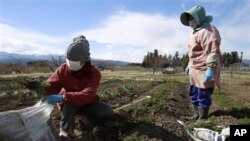A former high-level U.S. diplomat, who was posted in Japan for many years, is speaking out about Tokyo's initial response to the Fukushima nuclear crisis.
He is also revealing the level of concern that was expressed behind closed doors in Washington at that time.
After a magnitude 9.0 earthquake and historic tsunami battered northeastern Japan on March 11 a veteran U.S. diplomat, who had just been removed from the top post on the island of Okinawa, was among those put in charge of a crisis task force in Washington.
Kevin Maher says American decision-makers quickly realized there was little reliable data coming from their Japanese counterparts about the Fukushima-1 nuclear power plant.
"There was a point where we told the Japanese government, 'Look you guys got to take this seriously. This is a real serious situation. The government needs to respond to this.' And, I think the [Japanese] government eventually came to that conclusion, itself," he said.
Maher says that was based on flights over the crippled nuclear plant by a U.S. Air Force (RQ-4) Global Hawk remotely piloted plane. The unmanned aircraft took photographs and could roughly gauge temperatures inside the damaged reactor and spent fuel buildings.
"And when you looked at the information we did have, it was very clear to me early on that there had probably been at least one, probably two meltdowns," Maher stated.
Maher recalls that prompted the U.S. government to explore scenarios for evacuations, including transporting 100,000 American citizens from the Tokyo metropolitan area.
That did not happen. Instead the State Department advised U.S. citizens to keep 80 kilometers away from the Fukushima plant. Plume projections modeled by U.S. agencies did not show significant levels of radiation would envelope the capital. But a voluntary departure plan for U.S. government employee families in Japan was also implemented.
Maher blamed Japan's confusing and belated response to the crisis on the government’s traditional consensus decision-making process. He says crucial information was not being shared among relevant Japanese government ministries and agencies.
Maher, who is fluent in Japanese and has spent 19 years living in Japan, is known for being outspoken, not a typical trait for diplomats.
Maher had been ousted from his post as Director of the Office of Japan Affairs of March 10, the day before the disaster struck.
Maher retired from diplomatic service in April after allegations that he made offensive comments about Okinawans during an off-the-record State Department briefing last December for students from American University in Washington.
The comments, based on a student memo composed in mid-February, were first revealed by the Kyodo news agency.
Maher denied saying Okinawans were "lazy" or "masters of manipulation and extortion." He called the newspaper story fraudulent and says he was misquoted by students who had links to anti-base activists. He says the Kyodo reporter was more interested in pursuing a political agenda than accurately reflecting his comments.
The former diplomat says the U.S. ambassador in Japan and State Department officials denied him a chance to rebut the remarks because they did not want the issue to escalate at a time of sensitive discussions about the future of American military bases on Okinawa.
A book that Maher, now a consultant, wrote in Japanese, "The Japan That Can't Decide" was released here Thursday.




